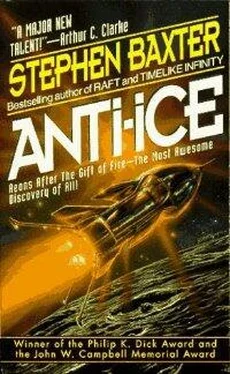“And you?”
“Strictly pleasure,” she said, her voice light and a little bored. “This is one of the highlights of the season; and soon I shall be winging my way to Belgium for the launch of the Prince Albert. You British certainly throw good parties these days.”
“And if all the guests are as charming as you, I am sure the trouble is worth while.”
She raised her eyebrows at this clumsy gallantry. “Will you attend the Albert launch, Mr. Vicars?”
I frowned. “I fear my assignment with Herr Bismarck’s party will keep me occupied until after the launch. But,” I went on hurriedly, “perhaps we—”
But there was no possibility of further discussion with this intriguing stranger; for, to a peal of choral voices which dazzled from the glass walls, the royal procession was proceeding grandly up a shallow flight of stairs to the dais. His Imperial Majesty himself was a neat figure in black, almost lost amid scarlet and silver uniforms. A little behind Edward marched Gladstone, the Prime Minister, his gray suit a splash of drabness in the military glitter.
The choir fell silent, last echoes rattling around the panes like trapped birds. Then the Archbishop of Canterbury stepped forward, miter and all, and called us, in sonorous tones, to prayer.
A reverent hush descended on the grand multitude.
Then Edward himself stood up. I was far away in that vast field of a building, but I could see how he adjusted his pince-nez and referred to a small notebook. His voice was low, yet it seemed to fill the great glass hall.
His words plain and unaffected, he recalled the first Exhibition of 1851 which, like the present one, had been intended to “wed high art with the greatest mechanical skills;” that earlier fair had been inspired by Edward’s father, the Prince Consort Albert, since lost to the typhoid; and Edward remarked how proud Albert would have been to see the events of today.
As the King spoke I was assailed by a sense of dislocation. Heads of state like Bismarck and Grant stood respectfully, here at the heart of the most powerful Empire the world had ever known: an Empire whose ships owned the seas, and whose anti-ice mechanical marvels girdled the globe.
And yet here was nothing more than a thin, rather shallow-looking young chap, quietly speaking of his lost father.
His Majesty concluded and retired, and the choir ripped into the Hallelujah Chorus.
Françoise leaned close to me and murmured through the music, “Rather a subdued performance from your new King.”
“I’m sorry?”
“The stories are that young Edward, with his circle of well-to-do friends like Lipton, is something of a—what is the word? a sybarite? Such a shallow hedonist matches well the type of men of power in your country today—I mean the industrialists—as his mother never could.”
A little stiffly I replied, “Victoria abdicated after the loss of her husband, and the sudden retirement of Disraeli two years ago. And as for Edward—”
But her moist lips had formed into a delicious—but mocking—moue. “Oh, have I offended you?… Well, I apologize. But Edward is right about one thing: that Albert would have been proud to see this. And even more proud to see the behavior of the craven politicians of your Parliament.”
Her perfume filled my head, and I struggled to retain my powers of speech. “What do you mean, mam’selle?”
She brushed her glove through the air. “Françoise, please. Your parliamentarians opposed Albert’s first Exhibition; and yet when they saw how well it achieved its principal aim they have fallen over each other to endorse subsequent events.” She looked at me quizzically, and two small wrinkles appeared above her button nose. “You do understand the purpose of such fairs, do you not, Mr. Vicars?”
“As His Majesty said, a celebration of—”
Again the glove waved, a little more impatiently. “To promote trade, Mr. Vicars. Your Crystal Cathedral is a vast shop window for your wonderful British goods.”
As I trawled my dim brain for a means of continuing the conversation, Françoise’s companion touched her arm. “We must not detain your new friend, my dear.” His accent was clumsy, and he fixed me with a fish-like stare. “I am sure he has duties.”
We introduced ourselves formally—he turned out to be one Frédéric Bourne, an aristocratic young Frenchman of no discernible occupation—and we shook hands even more stiffly.
Françoise watched this with a clinical amusement.
The music was done; the stewards dismantled the rope barriers, and the rows of dignitaries broke ranks. I turned to Françoise once more. “I have been pleased to meet you.”
“And I you,” she said rapidly in French. “At least, I was pleased to find that you were not one of that party of German pigs.”
These words shocked me. “Mam’selle,” I protested in her language, “you hold powerful views.”
“Does that surprise you?” She raised a perfect eyebrow. “You are a diplomat, sir; surely you understand the significance of the Ems telegram?”
This document was indeed the talk of Europe at that time. A dispute between France and Prussia had flared over King William’s proposal of his relative, Prince Leopold Hohenzollern, as candidate for the throne of Spain (which had been vacated by the scandalously promiscuous Queen Isabella). France, of course, had protested strongly; but representations made directly to William by the French ambassador had fallen on deaf ears. Now these representations had been portrayed insultingly by the Prussians in the famous Ems telegram.
“The document,” said the girl, “is an affront to France.”
I smiled, I hoped indulgently. “My dear mam’selle, such antique issues as the Spanish succession are scarcely of significance in the modern world.” I waved my hand at the marvels all around us. “And this, mam’selle, is the modern world!”
She frowned. “Really. Pray do not patronize me, sir. It is obvious to all but the most naпve—” I reddened “—that the Spanish candidature is indeed of little intrinsic interest, but it is the issue which the devious Bismarck is exploiting in order to provoke a war with France.”
I leaned toward her and quietly expressed the view of the British diplomatic corps. “To be honest, mam’selle, the Prussians are a bit of a joke, for all their posturing.” I ticked points on my fingers. “First, France possesses the finest army in Europe. Second, we live in an era of Rationality. There is a Balance of Power which has endured since the Congress of Vienna, which followed Bonaparte’s fall more than fifty years ago; and—”
She silenced me with a wave. “Bismarck is an opportunist. He cares nothing for your Balance; his motivation is his own ambition.”
I shook my head. “But how would a war with France serve him?”
“You must ask him that, Mr. Vicars. As for France, you are surely aware that we have already mobilized.”
I felt my mouth drop open, like some fish’s. “But—”
But the swarthy Bourne was touching her sleeve once more, and she terminated our conversation gracefully. I steadily cursed myself. To have allowed my conversation with this vision to meander into the obscurities of the Hohenzollern candidature! What had I been thinking of?
I called after her, “Perhaps I will see you later in the day…?”
But she was gone in the dissolving throng.
* * *
Exhibits were laid out around the Cathedral floor—and the balcony which circled the walls—under massive signs identifying their countries of origin. These signs were constructed from tubes glowing with electric light. Bismarck and his entourage toured the displays with patience and humor. They were particularly drawn by the stand from the United States of America. Among the Colt revolvers, tubs of chewing tobacco and other expressions of the American character, there was a reaping machine provided by the McCormick company; its steam stack and boiler looked large enough for a battleship, and the Prussians gathered in an awed group beneath six-feet-tall cutting blades.
Читать дальше












